 Petzlover
Petzlover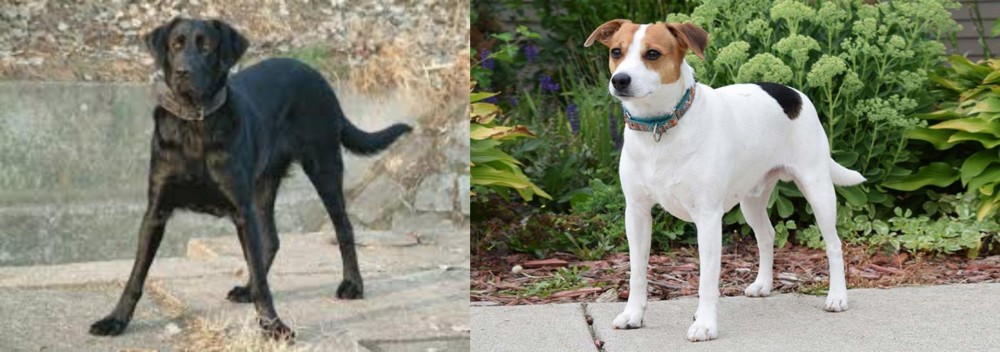 Cao de Castro Laboreiro is originated from Portugal but Danish Swedish Farmdog is originated from Denmark. Cao de Castro Laboreiro may grow 23 cm / 10 inches higher than Danish Swedish Farmdog. Cao de Castro Laboreiro may weigh 58 kg / 128 pounds more than Danish Swedish Farmdog. Cao de Castro Laboreiro may live 3 years less than Danish Swedish Farmdog. Cao de Castro Laboreiro may have more litter size than Danish Swedish Farmdog. Both Cao de Castro Laboreiro and Danish Swedish Farmdog requires Low Maintenance.
Cao de Castro Laboreiro is originated from Portugal but Danish Swedish Farmdog is originated from Denmark. Cao de Castro Laboreiro may grow 23 cm / 10 inches higher than Danish Swedish Farmdog. Cao de Castro Laboreiro may weigh 58 kg / 128 pounds more than Danish Swedish Farmdog. Cao de Castro Laboreiro may live 3 years less than Danish Swedish Farmdog. Cao de Castro Laboreiro may have more litter size than Danish Swedish Farmdog. Both Cao de Castro Laboreiro and Danish Swedish Farmdog requires Low Maintenance.
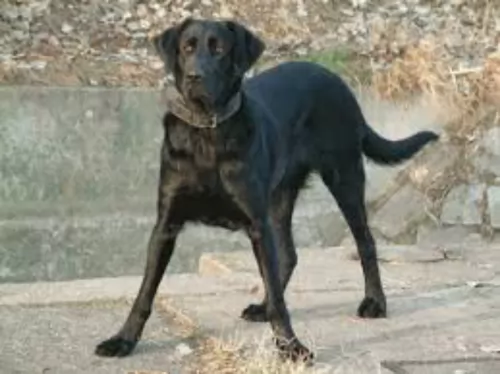 Cão de Castro Laboreiro originates from Portugal. Also known as the Portuguese Cattle Dog he was used long ago to guard livestock. Today, the modern Cao de Castro Laboreiro is descended from the molosser type dog.
Cão de Castro Laboreiro originates from Portugal. Also known as the Portuguese Cattle Dog he was used long ago to guard livestock. Today, the modern Cao de Castro Laboreiro is descended from the molosser type dog.
There are hints to the dog's origins from the 19th century, but changes in agricultural methods meant a disappearance of the dog as a livestock protector. Today the dog is mostly kept as a pet and was first seen at a dog show in 1914.
The Cão de Castro Laboreiro is recognized by the Fédération Cynologique Internationale as well as being recognized by the United Kennel Club in the United States.It is a rare dog and not many exist today but in Portugal, the USA and United Kingdom you will find a few breeders.
 The Danish Swedish Farmdog has over the centuries been a versatile dog, working on farms. The history of this dog goes way back to the 1700s, being found in Denmark and Sweden where they originated.
The Danish Swedish Farmdog has over the centuries been a versatile dog, working on farms. The history of this dog goes way back to the 1700s, being found in Denmark and Sweden where they originated.
Today these dogs are also found in other countries. As life changed, the dog’s functions on the farm became less and the dog seemed to disappear somewhat. Both the Danish and Swedish Kennel Clubs worked together to bring back the breed, resulting in the first breed standard in 1987.
The Danish-Swedish Farmdog was also recorded in the American Kennel Club Foundation Stock Services in 2011. Today, most of these dogs are owned as family or companion dogs.
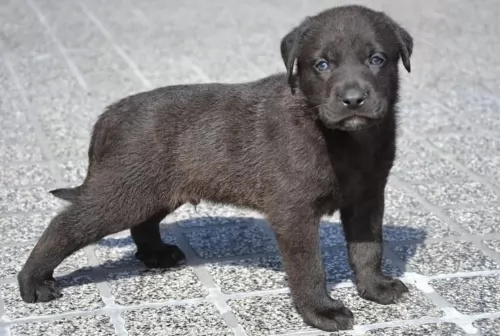 The Cão de Castro Laboreiro is a large dog, with height being in the region of 55 to 60cm and weight being in the region of 45 - 70kg. People describe the dog as wolf-like with a coat that is fairly short, thick and course. The coat is brindle with a base color of shades of grey, chestnut and black.
The Cão de Castro Laboreiro is a large dog, with height being in the region of 55 to 60cm and weight being in the region of 45 - 70kg. People describe the dog as wolf-like with a coat that is fairly short, thick and course. The coat is brindle with a base color of shades of grey, chestnut and black.
This large mastiff-type dog always has a black nose, his tail is long and carried high, but never curling over the back. He has a broad head and is much like the Labrador in looks, being free of wrinkles on the face.The ears of the Cao de Castro Laboreiro are medium-in-size and floppy while the eyes are dark brown.
The Cao de Castro Laboreiro makes an excellent pet as he forms strong bonds with his human family. He is territorial and makes an exceptional guard dog. He doesn’t particularly like strangers and is aloof around them.
This is an intelligent dog breed, he is strong-willed and stubborn, but when he is around the children in the family he is gentle and loving. When he has been trained and socialized, which is always highly recommended with every dog, he gets along with other pets in the home too.
 Nobody could be blamed for thinking that the Danish Swedish Farmdog is a Fox Terrier, because he looks very similar. He also has a short, smooth coat which is odor-free and he is a wonderfully low maintenance breed. The coat does however shed throughout the year.
Nobody could be blamed for thinking that the Danish Swedish Farmdog is a Fox Terrier, because he looks very similar. He also has a short, smooth coat which is odor-free and he is a wonderfully low maintenance breed. The coat does however shed throughout the year.
The coat’s main color is white with patches of black, fawn or chocolate brown. He can also be tri-colored. He is a small to medium sized dog with a compact body, standing between 32 - 37 cm and weighing about 7 – 12kg. He has a deep chest while the head is lean, small and triangular shaped. The ears are semi erect or they can be floppy while the tail is long.
The Danish Swedish Farmdog is not only intelligent, but he has other excellent characteristics that make him such a splendid pet. He isn’t aggressive, he is playful, loving, loyal, social and energetic.
He therefore makes an exceptional pet. He is an amusing pet who will prove to be entertaining too. He loves being part of all the family’s activities and gets on well with children and pets in the home.
You want to be sure that you provide him with exercise and games so that he doesn’t become bored, frustrated and destructive. After all, he is a breed that is used to be busy and he won’t do well with a family who puts him in the back yard and just leaves him.
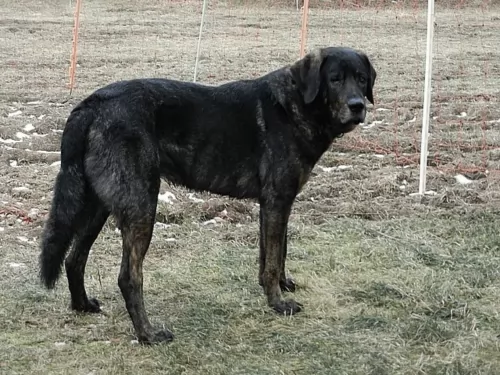 Environment and upbringing have plenty to do with how a dog turns out. People who just buy a dog for guardian purposes and nothing else can’t expect companionship in return.
Environment and upbringing have plenty to do with how a dog turns out. People who just buy a dog for guardian purposes and nothing else can’t expect companionship in return.
The Cão de Castro Laboreiro has always been a fearless guardian of livestock with his strong protective characteristics. He is intelligent and recognizes that a child in the family needs his protection.
This is a large dog who is strong, brave and intelligent but with his human family he is gentle, loving and loyal. Nonetheless he still requires a firm owner, and if you’re fair and firm with him you get the best with him. With this dog you can form a close friendship and bond.
 The Danish Swedish Farmdog has got everything going for him that makes him such a wonderful pet to have. He fits well into city- or country life, although wherever you live, you’ll need to ensure he is well exercised.
The Danish Swedish Farmdog has got everything going for him that makes him such a wonderful pet to have. He fits well into city- or country life, although wherever you live, you’ll need to ensure he is well exercised.
He is a child-friendly- and pet-friendly pet and he also happens to be low maintenance. You just need to brush him twice a week. You aren't likely to spend much on vet's fees with him either.In exchange for his love and devotion, make sure that you give every everything he needs to ensure his health and happiness.
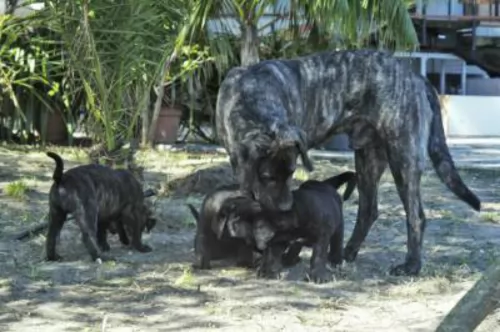 The Cão de Castro Laboreiro is generally a healthy breed, but even so, it is good to be aware of typical canine diseases that your pet may develop.
The Cão de Castro Laboreiro is generally a healthy breed, but even so, it is good to be aware of typical canine diseases that your pet may develop.
There are many eye problems that dogs have to contend with and if you see any kind of ulceration in your dogs eye, get veterinary advice.
A dog should always have access to a shady spot. Never ever leave your dog in a hot car. Heat builds up quickly and death can result soon as the body temperature rises.
Roundworm and tapeworm can infest dogs and you’ll need to speak to your vet about a worming program. Lice, mites and ticks are all parasites which attach themselves to the skin.
 Danish-Swedish Farmdogs have a lifespan ranging from 11 to 15 years. They are hardy dogs, not suffering from any breed specific genetic issues.
Danish-Swedish Farmdogs have a lifespan ranging from 11 to 15 years. They are hardy dogs, not suffering from any breed specific genetic issues.
However, it pays off to know of some of the common dog illnesses there are. If you provide your dog with high quality, nutritious food, good exercise and plenty of love and care, he can reach 15 years of age. Some of the more common dog illnesses to look out for -
It is always a good idea to have this testing for your dog. In fact, hip testing can spare you a great deal of anguish later on with your pet.
Hip dysplasia is a common skeletal disorder in dogs and although it is more prevalent in large dogs, smaller dogs can also get it.
You’ll notice your pet running with a strange gait and sometimes when he lies down, he’ll battle to get up again.
Recognizing the clinical signs of hip dysplasia is important to spare your dog a whole lot of pain, discomfort and even lameness.
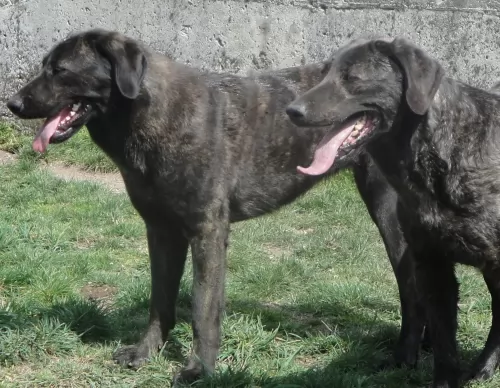 The Cao de Castro Laboreiro has a short coat which requires minimal grooming. Brushing him twice a week to rid him of loose hairs will suffice.
The Cao de Castro Laboreiro has a short coat which requires minimal grooming. Brushing him twice a week to rid him of loose hairs will suffice.
Nail clipping as well as ear- and teeth cleaning are other routine maintenance procedures for your pet.
The food you give your pet must be well-balanced and have protein and carbohydrates. If you want his skin and hair to remain healthy, vitamins, fatty acids and minerals will also be needed.
Boneless chicken and fish, brown rice and vegetables can be a good choice as well as some of the top quality commercially manufactured foods. An active dog will always need a higher protein content and therefore including raw meat into the diet is imperative – not every day as it can be very expensive, but every other day.
Remember that bones can be dangerous as they can splinter and cause your pet internal damage. Fresh, cool water must be available at all times.
 The Danish Swedish Farmdog isn’t going to be requiring too much grooming. He has a short, smooth coat which actually repels dirt.
The Danish Swedish Farmdog isn’t going to be requiring too much grooming. He has a short, smooth coat which actually repels dirt.
Because his coat is odor-free, he certainly can get by without bathing. This is good news, as bathing a dog strips the skin of its natural oils. You can always just wipe his coat down with a damp cloth to rid it of dust and give his coat a good brushing twice a week to remove it of loose hairs.
It is always a good idea to check your pet’s ears to see that they remain free of debris and wax. There are ways and means to do this, and if you’re not sure how, your vet or doggy parlor can explain the process.
Check his nails to ensure they don’t get too long. This is prone to happen when your pet runs constantly on grass and doesn’t come into contact with a hard surface which files the nails down naturally.
Also, dental care is most important, and you need to brush your pet’s teeth 2 or 3 times a week with special toothpaste and toothbrush designed for dogs. Bad teeth don’t only affect the mouth of the dog, they can be detrimental to every part of your dog’s body.